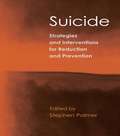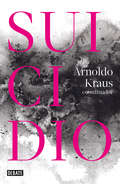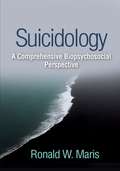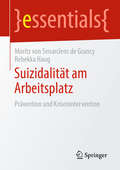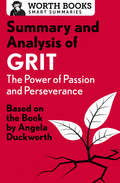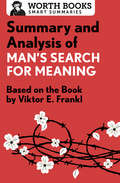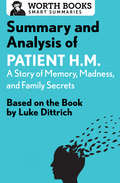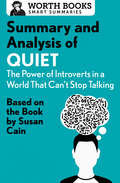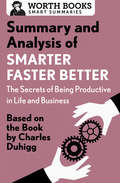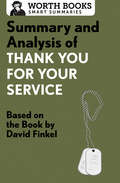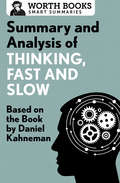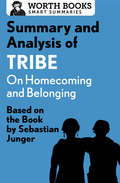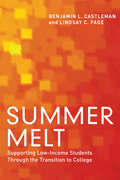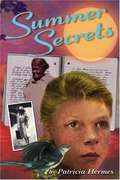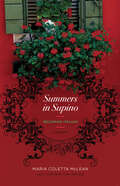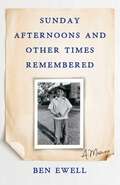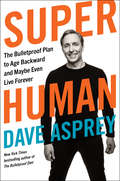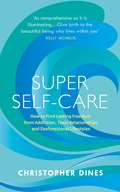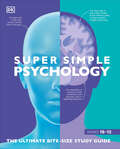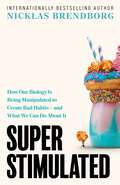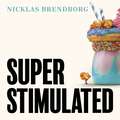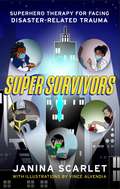- Table View
- List View
Suicide: Strategies and Interventions for Reduction and Prevention
by Stephen PalmerAll practitioners working in the caring and helping professions face many challenges and questions when dealing with suicidal clients: Is this client being serious? Can I do more? What should I do? Should I refer on? Should I break confidentiality? Have I assessed this client correctly? Both experienced practitioners and trainees wish to have more knowledge about assessing and dealing with suicidal clients. Suicide: Strategies and Interventions for Reduction and Prevention examines myths about suicide, explores facts and statistics at national and international levels, and uses client cases to uncover thoughts leading to suicidal behaviour. The editor offers an insight into what can be done in the community, and within therapeutic settings when working with this challenging client group. Contributions are divided into four parts, covering: suicide: statistics, research, theory and interventions personal experience of suicide three therapeutic approaches to prevent suicide group interventions. Featuring chapters from a range of experienced practitioners, this book provides a wealth of information on strategies and possible interventions. The addition of a self-harm management plan, assessment checklists, and list of useful organizations makes it essential reading for both mental health professionals, and those in training.
Suicidio
by Arnoldo KrausSegún datos de la OMS, el suicidio es la segunda causa de defunción entre las personas jóvenes, con un total aproximado de 800 000 muertes al año a nivel mundial. Esto lo convierte en uno de los problemas de salud mental más preocupantes del presente, situación que se agrava debido a la creciente desigualdad económica y social, así como a la depresión debida a la pandemia por covid-19. En este libro, Arnoldo Kraus reúne a algunas de las voces más relevantes del panorama científico, intelectual y literario de nuestro país para discutir el fenómeno del suicidio, en un intento por comprenderlo mejor, sin mitos ni prejuicios. Algunas de las preguntas que cruzan estas páginas indagan sobre las circunstancias que propician los pensamientos suicidas, sobre la posibilidad de prevenirlo y sobre la necesidad de que no se estigmatice y se comprenda como un derecho irrenunciable cuando la vida ya no es digna ni plena. Lejos deofrecer respuestas definitivas o de censurar los hechos desde la superioridad moral, la intención principal de estos textos es propiciar un diálogo honesto y plural sobre uno de los problemas más profundos de la condición humana : la terrible angustia de sentir que la vida no vale la pena. Asunción Álvarez del Río | Roger Bartra Marisa Belausteguigoitia Rius | Sergio García Ramírez | Enrique Graue | Arnoldo Kraus | Marta Lamas | Antonio Lazcano | Jorge Linares | Ana López | Sandra Lorenzano | María Elena Medina-Mora | Eduardo Matos Moctezuma | Mineko Mori | Laura Emilia Pacheco | Vicente Quirarte | Jesús Ramírez-Bermúdez | Eunice Rendón | Latife Salame | Beatriz Vanda | José Woldenberg
Suizidalität am Arbeitsplatz: Prävention und Krisenintervention (essentials)
by Moritz von Senarclens de Grancy Rebekka HaugDas essential bespricht Aspekte des Suizidrisikos im Unternehmen und stellt Präventionsmaßnahmen und Maßnahmen zur Krisenintervention vor. Der Autor und die Autorin führen Techniken wie das Containing ein und diskutieren den Umgang mit emotionalen Reaktionen wie Hoffnungslosigkeit, Ohnmachtsgefühle oder Autoaggressivität. Psychoanalytisches Hintergrundwissen und ein kulturgeschichtlicher Überblick zum Suizid bereichern den Band. Besondere praxisrelevante Aspekte sowie rechtliche Fragen zum Suizid am Arbeitsplatz runden die Einführung ab.
Summary and Analysis of Grit: Based on the Book by Angela Duckworth (Smart Summaries)
by Worth BooksSo much to read, so little time? This brief overview of Grit tells you what you need to know—before or after you read Angela Duckworth&’s book. Crafted and edited with care, Worth Books set the standard for quality and give you the tools you need to be a well-informed reader. This short summary and analysis of Grit by Angela Duckworth includes: Historical contextChapter-by-chapter summariesImportant quotesFascinating triviaGlossary of termsSupporting material to enhance your understanding of the original work About Angela Duckworth&’s Grit: Psychologist Angela Duckworth blows the lid off of theories that suggest IQ and socioeconomic status are the sole predictors of success. Not intellectually gifted, according to her traditional, Asian-American father, Duckworth nevertheless became a MacArthur &“Genius.&” Winning the award led her to reflect upon the qualities that got her there: perseverance and passion. Interviewing dozens of the world&’s winners, Duckworth ventures into the playing fields of achievement, speaking with CEOs and coaches, and visits West Point, competitive swim teams, and even the National Spelling Bee to discover the common threads. Pulling from history, as well as cutting-edge neuroscience and behavioral science, Grit offers tips and advice for everyone—from parents to athletes to entrepreneurs—about how getting gritty can help you to succeed. The summary and analysis in this ebook are intended to complement your reading experience and bring you closer to a great work of nonfiction.
Summary and Analysis of Man's Search for Meaning: Based on the Book by Victor E. Frankl (Smart Summaries)
by Worth BooksSo much to read, so little time? This brief overview of Man&’s Search for Meaning tells you what you need to know—before or after you read Viktor E. Frankl&’s book. Crafted and edited with care, Worth Books set the standard for quality and give you the tools you need to be a well-informed reader. This short summary and analysis of Man&’s Search for Meaning by Viktor E. Frankl includes: Historical contextChapter-by-chapter summariesImportant quotesFascinating triviaGlossary of termsSupporting material to enhance your understanding of the original work About Man&’s Search for Meaning by Viktor E. Frankl: Written just after World War II, Viktor Frankl&’s international bestseller Man&’s Search for Meaning is both a heartbreaking memoir and a source of inspiration for millions of readers. Dr. Frankl&’s description of his time in a string of Nazi concentration camps is a fascinating, mandatory read for anyone wanting a better understanding of the Holocaust. A highly respected psychotherapist, his ideas on human emotion, the mind, mental health, tragic optimism, and the day-to-day neuroses of common people in the modern world provide spiritual guidance as each of us searches for meaning in our own lives. The summary and analysis in this ebook are intended to complement your reading experience and bring you closer to a great work of nonfiction.
Summary and Analysis of Patient H.M.: Based on the Book by Luke Dittrich (Smart Summaries)
by Worth BooksSo much to read, so little time? This brief overview of Patient H.M. tells you what you need to know—before or after you read Luke Dittrich&’s book. Crafted and edited with care, Worth Books set the standard for quality and give you the tools you need to be a well-informed reader. This short summary and analysis of Patient H.M.: A Story of Memory, Madness, and Family Secrets includes: Historical contextChapter-by-chapter overviewsProfiles of the main charactersDetailed timeline of key eventsImportant quotesFascinating triviaGlossary of termsSupporting material to enhance your understanding of the original work About Patient H.M. by Luke Dittrich: Patient H.M. tells the extraordinary true story of Henry Molaison, a young man who underwent a lobotomy in 1953 in hopes of curing his epilepsy. Instead, he suffered extensive memory loss and would became the most studied patient in the history of neuroscience. Luke Dittrich, whose grandfather performed the surgery, artfully combines family history, medical science, and investigative journalism to create a suspenseful and unsettling narrative on the search to understand the most elusive of scientific research topics: the human memory. The summary and analysis in this ebook are intended to complement your reading experience and bring you closer to a great work of nonfiction.
Summary and Analysis of Quiet: Based on the Book by Susan Cain
by Worth BooksSo much to read, so little time? This brief overview of Quiet tells you what you need to know—before or after you read Susan Cain’s book. Crafted and edited with care, Worth Books set the standard for quality and give you the tools you need to be a well-informed reader. This short summary and analysis of Quiet: The Power of Introverts in a World That Can’t Stop Talking by Susan Cain includes: Historical contextChapter-by-chapter summariesImportant quotesFascinating triviaGlossary of termsSupporting material to enhance your understanding of the original workAbout Quiet by Susan Cain: It’s time for a “quiet revolution!” America’s “culture of popularity” holds extroverts—those who are gregarious, outspoken, and larger-than-life—in higher regard than those who tend to be reserved, serious, and contemplative. But think of all the great introverts—Rosa Parks, Albert Einstein, John Quincy Adams, and Lewis Carroll, to name a few—who were great leaders and thinkers, but just have a different way of expressing themselves. Based on extensive research related to the latest psychology and neuroscience, and in-depth interviews with renowned psychologists and professors, Quiet looks at “the power of introverts” from a cultural point of view. The summary and analysis in this ebook are intended to complement your reading experience and bring you closer to great works of nonfiction.
Summary and Analysis of Smarter Faster Better: Based on the Book by Charles Duhigg (Smart Summaries)
by Worth BooksSo much to read, so little time? This brief overview of Smarter Faster Better tells you what you need to know—before or after you read Charles Duhigg&’s book. Crafted and edited with care, Worth Books set the standard for quality and give you the tools you need to be a well-informed reader. This summary of Smarter FasterBetter by Charles Duhigg includes: Historical contextChapter-by-chapter summariesCharacter profilesDetailed timeline of eventsImportant quotesFascinating triviaGlossary of termsSupporting material to enhance your understanding of the original workAbout Smarter Faster Better by Charles Duhigg: Smarter Faster Better:The Secrets of Being Productive in Life and Business provides an in-depth look at some of the world&’s most successful individuals, teams, and corporations, and breaks down the secrets of their productivity. With deep analysis backed by recent scientific research, Smarter FasterBetter uncovers the art and science of how to get more done. From the story of how a group of creatives turned a failed script into Disney&’s megahit Frozen, to Jack Welch&’s ambitious goals at General Electric in the &’90s, to the trials and travails of a marine at basic training, Smarter Faster Better explains the science of productivity in a relatable, actionable, and interesting way. The summary and analysis in this ebook are intended to complement your reading experience and bring you closer to a great work of nonfiction.
Summary and Analysis of Thank You for Your Service: Based on the Book by David Finkel
by Worth BooksSo much to read, so little time? This brief overview of Thank You for Your Service tells you what you need to know—before or after you read David Finkel’s book. Crafted and edited with care, Worth Books set the standard for quality and give you the tools you need to be a well-informed reader. This short summary and analysis of Thank You for Your Service includes: Historical contextChapter-by-chapter overviewsProfiles of the main charactersImportant quotesFascinating triviaGlossary of termsSupporting material to enhance your understanding of the original work About Thank You for Your Service by David Finkel: Pulitzer Prize–winning author David Finkel’s Thank You for Your Service is an intimate and powerful account of the lives of Iraq veterans after they return home. Having depicted life on the front lines in Baghdad in his first book, Finkel follows the struggle of the same soldiers’ return to civilian life. He exposes the hidden costs of war: the reality of living with post-traumatic stress disorder, the physical wounds and financial struggles of military personnel, and the spiraling suicide rate amongst veterans. Soldiers are plagued by nightmares, memory loss, violent impulses, and guilt over their dead comrades. Spouses and children are bewildered by the return of their loved ones, whose personalities have changed beyond all recognition. Finkel humanizes the aftermath of military life and makes a strong case for increased investment in veteran mental healthcare. Thank You for Your Service has received great critical acclaim and was among the New York Times, the Washington Post, and the Economist’s top 10 Books of the Year in 2013.the The summary and analysis in this ebook are intended to complement your reading experience and bring you closer to a great work of nonfiction.
Summary and Analysis of Thinking, Fast and Slow: Based on the Book by Daniel Kahneman (Smart Summaries)
by Worth BooksSo much to read, so little time? This brief overview of Thinking, Fast and Slow tells you what you need to know—before or after you read Daniel Kahneman&’s book. Crafted and edited with care, Worth Books set the standard for quality and give you the tools you need to be a well-informed reader. This short summary of Thinking, Fast and Slow by Daniel Kahneman includes: Historical contextPart-by-part summariesDetailed timeline of key eventsImportant quotesFascinating triviaGlossary of termsSupporting material to enhance your understanding of the source work About Thinking, Fast and Slow by Daniel Kahneman: Nobel Prize–winning psychologist Daniel Kahneman explores the mysteries of intuition, judgment, bias, and logic in the international bestseller Thinking, Fast and Slow. His award-winning book explains the different ways people think, whether they&’re deciding how to invest their money or how to make friends. Kahneman&’s experiments in behavioral economics, in collaboration with cognitive psychologist Amos Tversky, led to a theory of two systems of thought: the fast thinking used when ducking a blow, and slow thinking that&’s better employed for making major life decisions. Applying these psychological concepts to different facets of our lives, Kahneman demonstrates how to better understand your own decision-making, and the choices made by others. The summary and analysis in this ebook are intended to complement your reading experience and bring you closer to great work of nonfiction.
Summary and Analysis of Tribe: Based on the Book by Sebastian Junger (Smart Summaries)
by Worth BooksSo much to read, so little time? This brief overview of Tribe: On Homecoming and Belonging tells you what you need to know—before or after you read Sebastian Junger&’s book. Crafted and edited with care, Worth Books set the standard for quality and give you the tools you need to be a well-informed reader. This short summary and analysis of Tribe includes: Historical contextChapter-by-chapter overviewsProfiles of the main charactersDetailed timeline of key eventsImportant quotesFascinating triviaGlossary of termsSupporting material to enhance your understanding of the original work About Tribe: On Homecoming and Belonging by Sebastian Junger: Drawing on his experience as a journalist covering conflicts in Afghanistan and Sarajevo, Junger studied how war and great hardship bring people together for the common good. He speaks of combat soldiers returning home only to miss the tight bonds of their platoon, which can lead to post-traumatic stress disorder. Based on additional research into history and social science, Tribe explores how much we can learn from tribal societies and their focus on loyalty, belonging, and sacrifice, in order to appreciate the power of connectedness in the modern world. The summary and analysis in this ebook are intended to complement your reading experience and bring you closer to a great work of nonfiction.
Summer Melt: Supporting Low-Income Students Through the Transition to College
by Benjamin L. Castleman Lindsay C. PageUnder increasing pressure to raise graduation rates and ensure that students leave high school college- and career-ready, many school and district leaders may believe that, when students graduate with college acceptances in hand, their work is done. But as Benjamin L. Castleman and Lindsay C. Page show, summer can be a time of significant attrition among college-intending seniors—especially those from low-income families. Anywhere from 10 to 40 percent of students presumed to be headed to college fail to matriculate at any postsecondary institution in the fall following high school.Summer Melt explores the complex factors that contribute to this trend—the absence of school support, confusion over paperwork, lack of parental guidance, and the teenage tendency to procrastinate. The authors draw on findings from fields such as neuroscience, behavioral economics, and social psychology to contextualize these factors. Drawing on a series of research studies, they show how schools and districts can develop effective, low-cost, scalable responses—including counselor outreach, peer mentoring, and using text messages and social media—to help students stay on track over the summer.Summer Melt offers very practical guidance for schools and districts committed to helping their students make the transition to college.
Summer Secrets
by Patricia HermesTwelve-year-old Missy tries to learn more about her mother's odd behavior as she and her two friends share some secrets during a long, hot summer in Mississippi toward the end of World War II.
Summers in Supino: A Memoir
by Maria McLean&“A vivid memoir&” of a time spent in Supino, Italy &“quickly transports readers into the charm and richness of village life . . . a story of love and family.&” (Publishers Weekly) Every summer Maria and her husband, Bob, went to their little house in the Italian village of Supino, and every year it was a new adventure. Only in Supino would you find a pizzeria in a sheep pasture, a seafood restaurant hidden in the woods, or an electrical cord draped from one balcony to the next so neighbours could share power. In Supino, they celebrate the first figs of the season; host watermelon, azalea, and artichoke festivals; and take pleasure in the magical view of the stars in the summer sky. Written with humour and heart, Summers in Supino is Maria Coletta McLean&’s memoir of these summers with Bob, as she becomes accustomed to the town her father grew up in and the peculiarities of the people who live there. Cousin Guido argues with their neighbour over who can plant a grapevine and therefore reap the harvest. Villagers debate whether one neighbour can trade the installation of some terra cotta tiles and the use of a pizza oven (he has yet to build) for the land beneath Bob and Maria&’s patio. And as Maria comes to understand her connection to this wonderful place, Bob proposes they open a coffee bar on the piazza. Full of wonderfully vivid stories of Italy, Summers in Supino also explores loss, grief, and the restorative power of community.
Sunday Afternoons and Other Times Remembered: A Memoir
by Ben EwellOn the afternoon of Easter Sunday, 1992, Ben Ewell&’s brother, sister-in-law, and niece were all murdered. While trying to make sense of this staggering tragedy, Ben can&’t help but think back through his life: the hard work and the many peaceful Sunday afternoons growing up on his family farm in Ohio in a house without a bathroom or running water; his high school antics in the 1950s; his time in Haight-Ashbury while attending law school in 1960s San Francisco; and the highs and lows, both personal and professional, of life after school. Threaded throughout these reminiscences, Ben reveals the details of the investigation of his family members&’ murders—and the arrest and trial of the parties involved.In this decades-long saga, there is marriage and divorce, love and loss, family and friendship; there are political campaigns and business ventures, some failed and some fruitful. Ultimately, this is a story of perseverance in the face of tragedy, of creating opportunities out of problems, and of appreciating the gift of life and the world around us—with some humor along the way.
Super Human: The Bulletproof Plan to Age Backward and Maybe Even Live Forever (Bulletproof #5)
by Dave AspreyFrom Bulletproof creator and bestselling author Dave Asprey comes a revolutionary approach to anti-aging that will help you up your game at any age.Dave Asprey suffered countless symptoms of aging as a young man, which sparked a life-long burning desire to grow younger with each birthday. For more than twenty years, he has been on a quest to find innovative, science-backed methods to upgrade human biology and redefine the limits of the mind, body, and spirit. The results speak for themselves. Now in his forties, Dave is smarter, happier, and more fit and successful than ever before. In Super Human, he shows how this is level of health and performance possible for all of us. While we assume we will peak in middle age and then decline, Asprey’s research reveals there is another way. It is possible to make changes on the sub-cellular level to dramatically extend life span. And the tools to live longer also give you more energy and brainpower right now. The answers lie in Dave’s Seven Pillars of Aging that contribute to degeneration and disease while diminishing your performance in the moment. Using simple interventions—like diet, sleep, light, exercise, and little-known but powerful hacks from ozone therapy to proper jaw alignment, you can decelerate cellular aging and supercharge your body’s ability to heal and rejuvenate. A self-proclaimed human guinea pig, Asprey arms readers with practical advice to maximize their lives at every age with his signature mix of science-geek wonder, candor, and enthusiasm. Getting older no longer has to mean decline. Now it’s an opportunity to become Super Human.
Super Self-Care: How to Find Lasting Freedom from Addiction, Toxic Relationships and Dysfunctional Lifestyles
by Christopher DinesChristopher Dines has profound experience of recovery and personal growth; he struggled with drug addiction for most of his young adult life, and came into recovery in 2004, after a career as a music producer and well-known electronic house DJ.In this book, he shares insights, epiphanies and practical strategies for anyone struggling with their wellbeing, but most particularly those in recovery from addiction, those in toxic relationships or those with destructive lifestyles and behaviours. Covering such resonant themes as feelings of unworthiness, the need for gentle compassion and the power of authentic relationships, this book offers an abundance of exercises to unlock a deeper understanding, and nearly 200 questions to enable a true self-appraisal. This is self-care at its most profound, resonant and visceral level - as more than just a regular yoga habit, Super Self Care offers a chance to rewrite the script that ties us to co-dependency, addictive behaviours and shame.
Super Self-Care: How to Find Lasting Freedom from Addiction, Toxic Relationships and Dysfunctional Lifestyles
by Christopher DinesChristopher Dines has profound experience of recovery and personal growth; he struggled with drug addiction for most of his young adult life, and came into recovery in 2004, after a career as a music producer and well-known electronic house DJ.In this book, he shares insights, epiphanies and practical strategies for anyone struggling with their wellbeing, but most particularly those in recovery from addiction, those in toxic relationships or those with destructive lifestyles and behaviours. Covering such resonant themes as feelings of unworthiness, the need for gentle compassion and the power of authentic relationships, this book offers an abundance of exercises to unlock a deeper understanding, and nearly 200 questions to enable a true self-appraisal. This is self-care at its most profound, resonant and visceral level - as more than just a regular yoga habit, Super Self Care offers a chance to rewrite the script that ties us to co-dependency, addictive behaviours and shame.
Super Simple Psychology: The Ultimate Bitesize Study Guide (DK Super Simple)
by DKAccessible to all, this jam-packed psychology study guide has everything students ages 16+ need to help them master this fascinating subject.Super Simple Psychology covers topics ranging from brain anatomy and memory to phobias and addiction, breaking complex information down into manageable, bite-size chunks.Packed with all the core US Advanced Placement, UK A Level, and International Baccalaureate curriculum topics, Super Simple Psychology will help students succeed in the classroom. Each topic is fully illustrated, makes the facts crystal clear and easy-to-understand, and brings the subject to life. Information panels explain and analyze key theories and studies, with the help of simple graphics. A useful "Key facts" box provides a summary that can be used to help with revision.With clear, concise coverage of all the core psychology topics, Super Simple Psychology is the perfect guide for students to support them with classwork and homework, and make studying for exams as stress-free as possible.
Super Stimulated: How Our Biology Is Being Manipulated to Create Bad Habits – and What We Can Do About It
by Nicklas BrendborgA fresh look at health, habits and longevity from internationally-bestselling author, Nicklas Brendborg - perfect for fans of Ultra-Processed People Sobering and empowering. This book is a call to awareness - and a toolkit for reclaiming our agency in a world that profits from our overstimulation. - DR JENNA MACCIOCHI ------IT'S NOT YOU. IT'S YOUR BIOLOGY.Modern society is plagued by health epidemics: obesity, record levels of loneliness, increasing mental health problems and various forms of addiction. From the outside, all these issues might seem unrelated. But a single phenomenon actually ties them all together: superstimuli.Superstimuli are exaggerated, unnatural versions of things we have evolved to want and need such as food, sex and social recognition. This hard wired evolutionary response is why we binge on fake ultra-processed food, lust after airbrushed people online, and struggle to stop scrolling on social media, even when it makes us feel bad. Our lack of control isn't because we are weak. It's because powerful companies spend billions creating superstimuli that manipulate our biology for profit, leaving us unhealthy and unhappy as a consequence.Super Stimulated shows how we can resist this hijacking of our natural instincts, recognise superstimulus traps, and take control of our bad habits to live longer, healthier lives.
Super Stimulated: How Our Biology Is Being Manipulated to Create Bad Habits – and What We Can Do About It
by Nicklas BrendborgA fresh look at health, habits and longevity from internationally-bestselling author, Nicklas Brendborg - perfect for fans of Ultra-Processed People Sobering and empowering. This book is a call to awareness - and a toolkit for reclaiming our agency in a world that profits from our overstimulation. - DR JENNA MACCIOCHI ------IT'S NOT YOU. IT'S YOUR BIOLOGY.Modern society is plagued by health epidemics: obesity, record levels of loneliness, increasing mental health problems and various forms of addiction. From the outside, all these issues might seem unrelated. But a single phenomenon actually ties them all together: superstimuli.Superstimuli are exaggerated, unnatural versions of things we have evolved to want and need such as food, sex and social recognition. This hard wired evolutionary response is why we binge on fake ultra-processed food, lust after airbrushed people online, and struggle to stop scrolling on social media, even when it makes us feel bad. Our lack of control isn't because we are weak. It's because powerful companies spend billions creating superstimuli that manipulate our biology for profit, leaving us unhealthy and unhappy as a consequence.Super Stimulated shows how we can resist this hijacking of our natural instincts, recognise superstimulus traps, and take control of our bad habits to live longer, healthier lives.
Super Stimulated: How Our Biology Is Being Manipulated to Create Bad Habits – and What We Can Do About It
by Nicklas BrendborgA fresh look at health, habits and longevity from internationally-bestselling author, Nicklas Brendborg - perfect for fans of Ultra-Processed People Sobering and empowering. This book is a call to awareness - and a toolkit for reclaiming our agency in a world that profits from our overstimulation. - DR JENNA MACCIOCHI ------IT'S NOT YOU. IT'S YOUR BIOLOGY.Modern society is plagued by health epidemics: obesity, record levels of loneliness, increasing mental health problems and various forms of addiction. From the outside, all these issues might seem unrelated. But a single phenomenon actually ties them all together: superstimuli.Superstimuli are exaggerated, unnatural versions of things we have evolved to want and need such as food, sex and social recognition. This hard wired evolutionary response is why we binge on fake ultra-processed food, lust after airbrushed people online, and struggle to stop scrolling on social media, even when it makes us feel bad. Our lack of control isn't because we are weak. It's because powerful companies spend billions creating superstimuli that manipulate our biology for profit, leaving us unhealthy and unhappy as a consequence.Super Stimulated shows how we can resist this hijacking of our natural instincts, recognise superstimulus traps, and take control of our bad habits to live longer, healthier lives.
Super Survivors: Superhero Therapy for Facing Disaster-Related Trauma
by Dr Janina ScarletHow do we survive when it feels like our world has ended?This interactive book is for anyone that has experienced trauma and feels the after-effects of fear, panic, worry, anxiety, anger or depression.You will join a group of other survivors who have lived through extraordinary times and situations, including a doctor who saw many patients die in a pandemic, a firefighter who feels ashamed about developing anxiety after a major tragedy, a nurse who lost a sibling in a school shooting, and others affected by a global health crisis and trauma in differing ways.This self-help manual is based on the techniques of Superhero Therapy and Acceptance and Commitment Therapy and will teach you the skills of acceptance, mindfulness, self-compassion, sense of purpose and commitment to action, as well as helping you to develop your own survivor story.This is the first book of its kind to help us deal with the realities and mental health impact of a world emerging from the unprecedented effects of COVID-19, as well as other natural disasters and violence.
Super Survivors: Superhero Therapy for Facing Disaster-Related Trauma
by Dr Janina ScarletHow do we survive when it feels like our world has ended?This interactive book is for anyone that has experienced trauma and feels the after-effects of fear, panic, worry, anxiety, anger or depression.You will join a group of other survivors who have lived through extraordinary times and situations, including a doctor who saw many patients die in a pandemic, a firefighter who feels ashamed about developing anxiety after a major tragedy, a nurse who lost a sibling in a school shooting, and others affected by a global health crisis and trauma in differing ways.This self-help manual is based on the techniques of Superhero Therapy and Acceptance and Commitment Therapy and will teach you the skills of acceptance, mindfulness, self-compassion, sense of purpose and commitment to action, as well as helping you to develop your own survivor story.This is the first book of its kind to help us deal with the realities and mental health impact of a world emerging from the unprecedented effects of COVID-19, as well as other natural disasters and violence.
